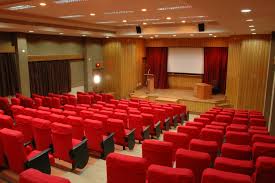记忆方法
将“auditorium”分解为“audio”和“-torium”。想象“audio”代表声音,而“-torium”是一个地点,如“theater”(剧院)。将这两部分结合起来,想象这是一个充满了声音(audio)的剧院(theater),即可以容纳观众听讲、表演或会议的场所。通过这样的联想,记忆“auditorium”作为大礼堂或会堂。
以上内容由AI生成, 仅供参考和借鉴
英语词源
- auditorium (n.)
- 1727, from Latin auditorium "lecture room," literally "place where something is heard," neuter of auditorius (adj.) "of or for hearing," from auditus, past participle of audire "to hear" (see audience); also see -ory. Earlier in the same sense was auditory (late 14c.).
权威例句
- 1. Men in green army uniforms are sprinkled throughout the huge auditorium.
- 穿着绿色军服的人星星点点地分布在整个大礼堂中。
- 2. The Albert Hall is a huge auditorium.
- 艾伯特音乐厅是一个大型音乐厅。
- 3. The teacher gathered all the pupils in the auditorium.
- 老师把全体同学集合在礼堂内.
- 4. We'll have the meeting in the classroom rather than in the auditorium.
- 我们与其在礼堂里开会,不如在教室里开会.
- 5. Who will undertake the job of decorating the auditorium?
- 谁来负责装饰礼堂的工作?
